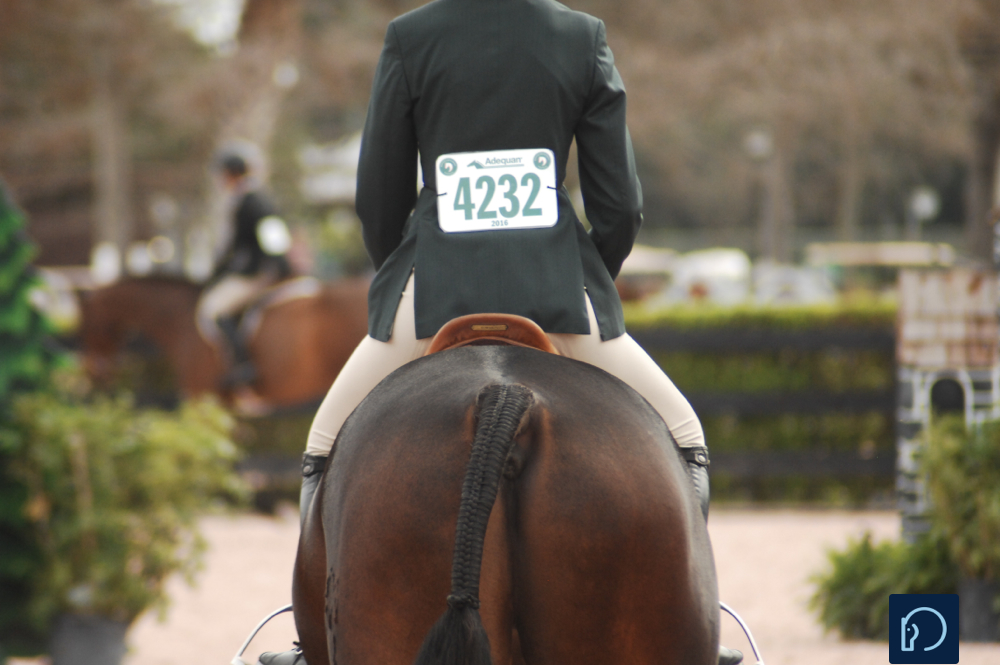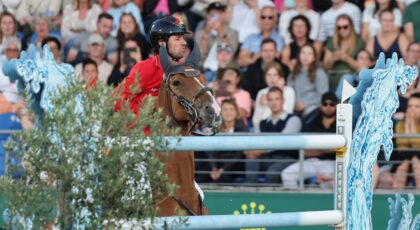Question: “I’m a lifelong rider and have been competing since I was a child. I’ve always struggled with paralyzing nerves on show day — even after decades of competing. It’s so frustrating! I’ve read sport psychology books, tried breathing exercises, you name it. Nothing seems to help. I feel stagnant in my progress. Is there hope for an amateur rider like me that just can’t seem to get a handle on their nerves?”
John Haime: Great question…and you are not alone!
The first question—always—is to ask what the reason might be that you are experiencing paralyzing nerves. How closely have you considered why your nerves are paralyzing?
As I mentioned in the video, nerves are ok; in fact, they are necessary to narrow the focus and get us ready for competition.
With our clients, we call it excitement, not nervousness. Great athletes aren’t nervous, they are ready and excited to show what they can do! They are grateful for the opportunity to test their training and check-in on their improvement.
So, the first step is to consider why your nerves might be running amok. What happens in the transition from your training to showing that creates an elevated level of nerves?
A few considerations
So, let’s first separate training from show day. Almost all riders experience no nerves in training, but some will suddenly experience an undesirable amount in show classes.
What’s different?
Typically, in training, a rider is in the moment enjoying the process of improvement and trying things to move the skill sets of both their horses and themselves forward.
Fast forward to show day and suddenly the attention is drawn from the moment and enjoyment of the process of improvement to the pressures of an outcome and what might happen in the future. Shifting the mind out of the moment and to the results stirs the emotions—enjoyment suddenly disappears and achievement and outcome become the sole focus.
It’s critical for any rider to take a page from training and be aware of the mindset. What would happen if you focused more on the process of improvement in show classes and worked to get closer to your training mindset?
What’s your purpose?
Why are you riding? Often that question, and the answer, can help soften the nerves and create a healthy perspective around your riding.
If you are riding for the “right” reasons, there really is no reason to have an extraordinary amount of nerves. The right reasons might include you just love the sport and want to be around horses and the barn. Riding is your passion and you have an appetite for improvement. You enjoy people who share your interest, and you want to interact with them.
This joyful mindset is always front and centre.

The wrong reasons often stir up more nerves than you might want. Wrong reasons might include trying to impress others, an obsession with trying to be too perfect or overemphasis on achievement and the pressures of winning classes.
When nerves are paralyzing you, a reminder about your real purpose—riding for the love of the sport—can create perspective for you and calm the nerves. Equestrians often get distracted by unimportant things and these distractions have a way of turning up the volume on the nerves.
What are you afraid of?
Fear has a way of elevating the nerves. Prior to performing, equestrians can create negative scenarios in their mind that impact the quality and calibre of their riding.
First, fear can be real in equestrian sport—the potential always exists for injury. But we can minimize risk to the best of our abilities by planning and proceeding with caution. Choosing the right partner and building that trust is step one. Step two could be looking at minimizing injury with safety equipment. Step three is disciplined technical and physical work to build the skills and confidence required to meet the requirements of a show class.
But while fear can be real, the reality is most fear is created by the rider. It is done by bringing past experience forward or projecting and engaging in the game of “what ifs.” When we recall negative emotional memories, we create anxious feelings that distract us from today’s class.
These experiences are real, but they are in the past. Your job is to bring all the great experiences forward and make those your focus.
What is more common is negatively focusing on what might happen in a class…but almost never does.
For example:
“What if I look foolish in the ring?”
“What if my training doesn’t work?”
“What if my partner isn’t right today?”
“What if I let my coach and supporters down?”
“What if I miss?”
Again, we can douse the flames of fear by working to be in the moment and not getting caught in the trap of bringing negative experiences forward or projecting scenarios that aren’t important at the ingate. A practical tip for learning how to build those focus muscles is to use simple online mindfulness APPS like Headspace, Calm, 10% Happier and others that provide good introductions for calming the mindset.

I hope these quick ideas are a starting point for you to address those overactive nerves.
First, endeavor to identify why nerves are paralyzing.
Second, clearly identify your purpose and ground yourself in that positive purpose. Remember that riding for the wrong reasons can quickly ignite nerves.
And, third, gain a healthy perspective on fear. Fear can be real, but much of it is created by a poor habit of bringing negative experiences forward or the “what ifs” back.
These are first steps in taking back control of your riding and not allowing outside factors to elevate your nerves. I look forward to your questions next month!
Have a mental skills question? Send it to editor@horsenetwork.com for the chance to be featured in a future Q&A column with John Haime.
John Haime is President of New Edge Performance. A world-class Human Performance Coach, former professional athlete and current bestselling author of You are a Contender! Build Emotional Muscles to Perform Better and Achieve More, John understands how athletes think and feel. He’s been there—under the most intense pressures of amateur and professional sports. John coaches leading professional equestrians and up-and-comers with a proven system and is trusted by some of the world’s leading athletes—professional and elite amateur. See www.johnhaime.com to learn more.


 March 5, 2020
March 5, 2020 

























